The Best Fleet Maintenance Software
Vehicle and truck maintenance software helps you manage preventive maintenance and log previous repairs. We assessed the top platforms for fleets of all sizes.
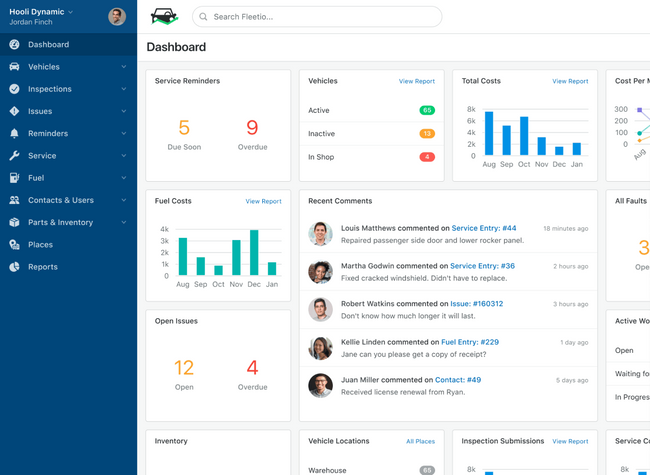
- Fuel card integration
- Maintenance and fuel expense reporting
- Easy to navigate
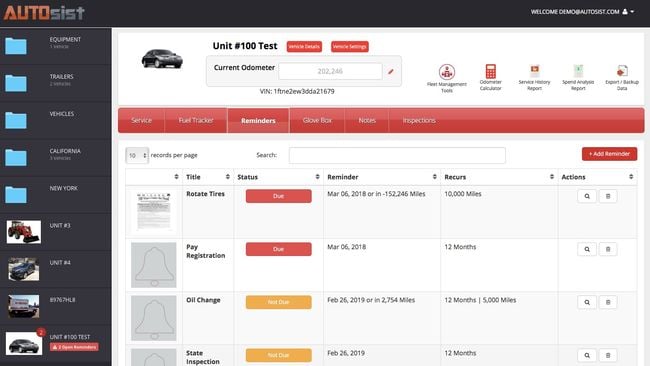
- Affordable pricing.
- User-friendly interface
- Mobile-friendly work order creation
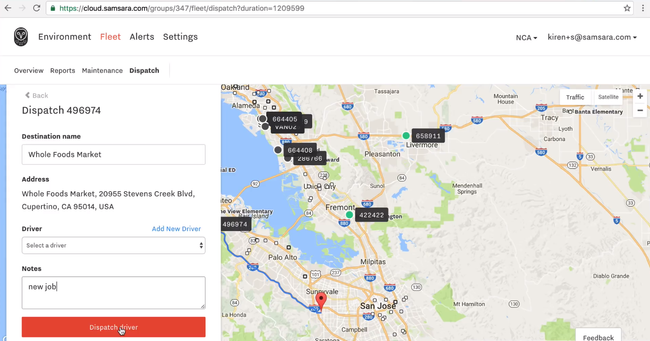
- Real time vehicle diagnostics
- Automatic fault detection
- Supports large and diverse fleets
To assist you in selecting the ideal solution for your business, we’ve identified and ranked the top fleet maintenance software available today.
| System | Standout Feature | Starting Price |
|---|---|---|
| AUTOsist | Straightforward work order management | $5/month/vehicle, with a $59/month minimum for 5 vehicles |
| Fleet Maintenance Pro | Parts inventory module | $30/user/month for cloud hosted, $1,495 for perpetual license |
| Fleetio | Fuel management module | $4/vehicle/month |
| Fullbay | Preventive maintenance scheduling | Quote-based |
| MaintainX | Mobile App | Free, $16/user/month for paid plan |
| Samsara | Vehicle diagnostics | Quote-based |
| Whip Around | Fleet reporting module | Free, $5/vehicle/month for paid plan |
- Fleetio: Best for Fuel Management
- AUTOsist: Best for Small Fleets
- Samsara: Best for Large Fleets
- Fullbay: Best for Heavy-Duty Trucks
- Fleet Maintenance Pro: Best Parts Inventory
- MaintainX: Best Mobile App
- Whip Around: Best for Fleet Reporting
Fleetio - Best for Fuel Management
Fleetio’s fuel management module helps you reduce consumption costs and detect engine issues. The system partners with several leading fuel card companies, like Comdata and FLEETCOR, to automatically pull all your fuel data. This allows smooth integration, so you can quickly begin tracking KPIs. Even if you don’t have company fuel cards, drivers can manually create entries from the mobile app.
The fuel history dashboard displays an overview of your entire fleet’s fuel data, like cost, volume, and average miles per gallon (MPG). From there, you can drill down into an individual vehicle to track consumption history over specific periods. Analyze trends in cost per mile and overall usage to identify any sudden spikes, which can signify underlying issues that may require maintenance. For example, if a truck consumes more gas than usual or gets less MPG, this may indicate poor engine health, low tire pressure, or improper tire alignment.
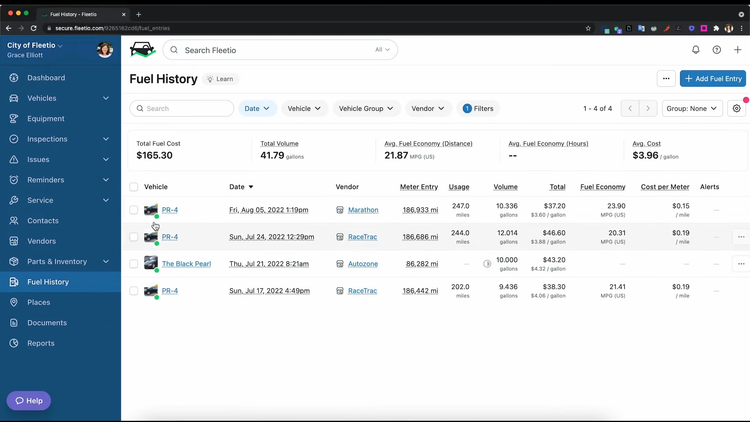
Beyond tracking data, Fleetio provides reporting tools to calculate the total cost of vehicle ownership. It allows you to compare your budget to actual spending and total utilization to maximize ROI for the entire fleet. Analyzing fuel, maintenance, and other costs on one dashboard enables you to adjust overall spending and better understand your operational expenses.
Fleetio provides an easy-to-use system with intuitive navigation between modules and centralized data. Its average starting price is $4/vehicle/month when billed annually, with a maximum of 100 vehicles. It’s a good option for small to midsize operations, but the per-vehicle pricing model may be too steep for larger operations.
See our Fleetio product page for more info.
AUTOsist - Best for Small Fleets
AUTOsist simplifies maintenance processes with its straightforward work order management module. The dashboard provides a list view of all the current tasks in the system, with color-coded status, assignee, title, and priority fields. Create work orders manually or automatically through PM schedules or failed inspections, with attached manuals and custom detail fields. Once created, the system instantly notifies the assigned technician to promote efficiency.
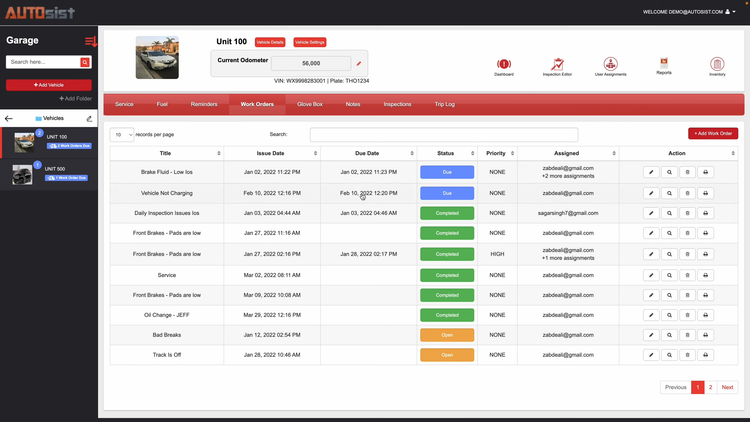
After completing work orders, you can store all historical fleet maintenance records in one centralized location. Because they are attached to specific vehicles, AUTOsist automatically files and organizes them accurately. Use the global search function or reference the most recent tasks to review what maintenance was performed, the date completed, and the assigned technician. This helps small operations upgrade from spreadsheets or pen-and-paper filing systems, where information is easily lost or inefficient to find.
For small trucking or logistics companies that want a maintenance-first system, AUTOsist is a good option. The All-in Maintenance package is $5/vehicle/month with a minimum of $59/month for five vehicles. While slightly more expensive than Fleetio, it offers more functionality in its cheapest plan, like PM scheduling, parts management, and custom DVIR digital inspection forms.
See our full AUTOsist review to learn more.
Samsara - Best for Large Fleets
Samsara offers proprietary IoT devices for real time vehicle diagnostics tracking. Monitor a constant stream of data for your entire fleet for crucial metrics like battery voltage, engine status, and fluid levels. It acts as a predictive maintenance tool, letting you spot issues before they lead to failures. This can reduce overall maintenance expenses by minimizing costly unexpected repairs.
The vehicle diagnostics tool also includes fault detection so you can immediately take action. These problems can include engine fault codes, piston misfires, or even failing batteries. Gaining this information is crucial for large fleet managers, as even minor problems in long-haul trucks or service vans can create unsafe conditions for drivers. It’s especially useful for large businesses, as it’s difficult to detect these problems for hundreds of vehicles using basic inspections alone.
In the maintenance tab, you can view each vehicle’s detected faults to quickly create work orders if the issues are severe enough. Because the error code and description transfer automatically, you can provide specific details within your maintenance requests so your crews know the exact problem. This helps reduce vehicle downtime and maintain a healthy fleet size, essential for high-delivery volume businesses.
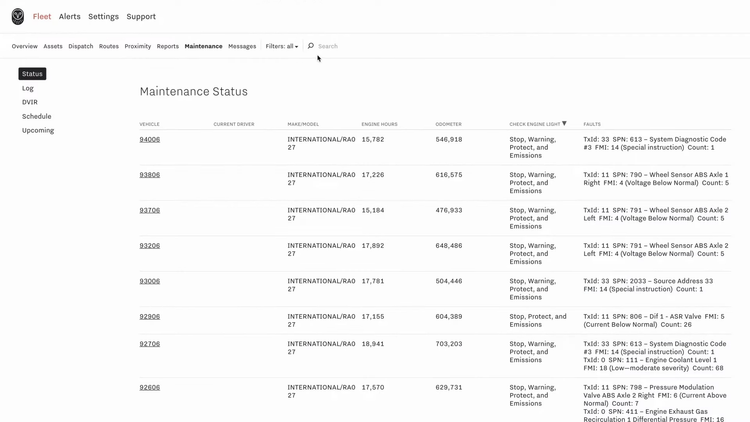
Samsara’s pricing is designed to suit diverse fleet sizes and types, requiring a custom quote based on your specific needs. Because of its large feature set and high cost for the system and hardware, smaller teams are better suited for a more straightforward system like AUTOsist.
Visit our Samsara product page.
Fullbay - Best for Heavy-Duty Trucks
Fullbay’s preventive maintenance tracking ensures your trucks are serviced before costly breakdowns occur. By integrating with GPS providers such as US Fleet Tracking and Geotab, Fullbay monitors data like mileage and engine hours to alert you when a vehicle is approaching its next scheduled maintenance. This is helpful for trucks operating under heavy loads, which accelerates wear and tear on components like engines, brakes, tires, and suspensions.
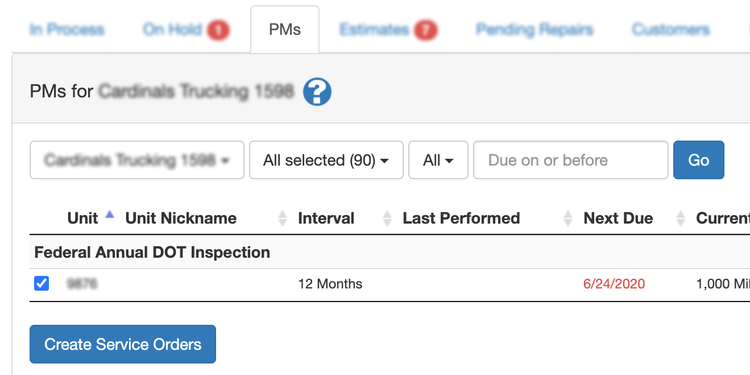
Fullbay also has a mobile-friendly platform, which lets your technicians access service histories, upcoming PMs, and inspection checklists from any device. This helps them complete preventive tasks seamlessly, ideal for fleets that demand quick turnaround times to ensure trucks remain functional across various locations.
Additionally, the software’s maintenance history reporting records every preventive service performed. These include fleet reports showing which vehicles have maintenance or inspections coming up. While Fullbay includes built-in financial tracking and A/R aging reports, it also integrates with QuickBooks Online to expand this functionality.
For repair shops or fleets offering mobile services, it’s worth noting that Fullbay is cloud-based. Since it requires an internet connection, areas without cell service may prevent updates from syncing in real-time.
Find out more about Fullbay on our product page.
Fleet Maintenance Pro - Best Parts Inventory
Fleet Maintenance Pro’s inventory module lets you track and monitor all parts used during maintenance. You can easily add all necessary items to a work order to ensure your techs have the proper tools to complete repairs. When inventory counts become too low, the system will send you alerts so you can ensure optimal levels. Even if the stock runs out, you can assign substitutions to use when placing a new order. This reduces time spent waiting for late reorders, helping you get your vehicles back on the road faster.
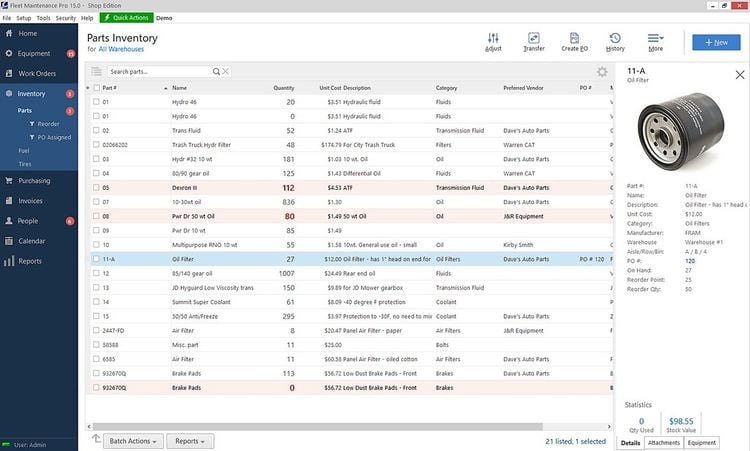
To better understand your inventory, the system’s reporting module lets you create pre-defined parts reports. These include:
- Stock value: Allows you to see the total value of your inventory broken down by each part. This can help identify overstocking issues to reduce unnecessary carrying costs.
- Usage summary: Shows how many of each part was used during a specific date range.
- Usage detail: To spot problematic trucks or vans, drill down and see which vehicles the parts were used on.
Fleet Maintenance Pro is the only system on our list that you can purchase outright, which is great if you need on-premise installation. It offers a Windows version that costs $1,495 for a perpetual license and the web version starting at $30/user/month billed annually.
Read more on Fleet Maintenance Pro’s product profile.
MaintainX - Best Mobile App
MaintainX’s mobile app is great for maintaining your entire fleet from any device. You can easily create, assign, and complete work orders from a phone or tablet, to eliminate lengthy paperwork. When you’re creating a WO, it lets you add pictures, notes, and procedures right from your phone. By having visual and text-based explanations, your techs can gain a better sense of the problem before they arrive for the job. This can help ensure jobs are done correctly the first time, increasing overall fleet uptime.
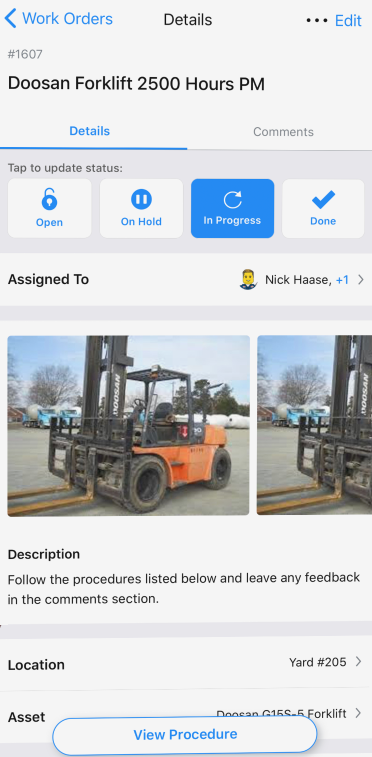
The mobile app also simplifies fleet safety and compliance inspections. You can create vehicle-specific digital forms for your drivers and techs to ensure they are safe to drive daily. Add procedures, pass/fail prompts, and checklists to a single form to ditch manual paper or spreadsheet methods. And if a vehicle fails, the system will automatically generate a corrective work order to fix it quickly.
MaintainX is also very affordable. Plans start at just $16/user/month billed annually. That said, most businesses will want to opt for the Premium plan at $49/user/month billed annually, as it has more features like parts inventory, meter-based maintenance, and unlimited procedures on work orders. And while the system is a broader CMMS software and not dedicated to just fleets like Fleetio or AUTOsist, it’s effective for companies where vehicles are part of a wider maintenance strategy, like field services or manufacturing.
See our full MaintainX Review to learn more.
Whip Around - Best for Fleet Reporting
Whip Around offers customizable dashboards to monitor fleet performance and maintenance KPIs in real time. In the inspections and defects section, you can compare passed vs. failed inspections and drill down into the specific issues causing failures. Scrolling down, you can see your maintenance summary to get a quick overview of upcoming tasks, current work orders, and total out-of-service assets. These dashboard reports provide easy-to-read metrics to gain insights into fleet and technician performance.
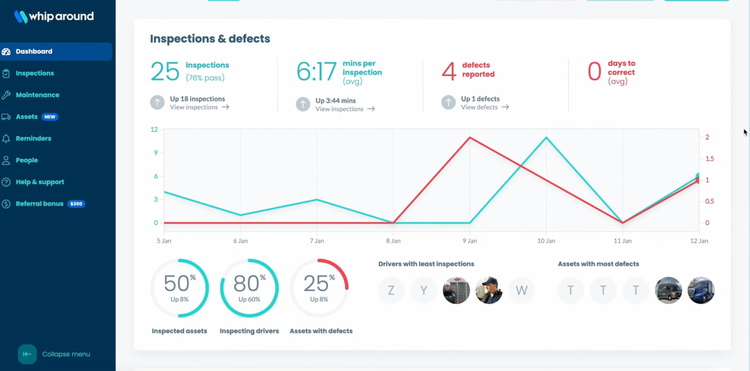
The system also helps you streamline DOT audits and comply with regulations, like the Federal Motor Carrier Safety Administration (FMCSA) section 396.1. This requires all commercial vehicle drivers to complete driver vehicle inspection reports (DVIRs) after each day’s work to ensure there are no defects. Whip Around automates pre and post-trip inspections through its mobile app and customizable forms. Then, it automatically files them for easy reference.
Whip Around offers several low-cost plans for small to midsize fleets. While it has a free plan, it only includes one vehicle and user, so it’s not a viable option for transportation and logistics companies. Also, its maintenance module isn’t available until the $9/asset/month Pro plan, which is more expensive than AUTOsist and Fleetio.
Other Systems We Like
Cetaris is a fleet maintenance system that integrates with over 300 systems, from ERPs to telematics. It offers essential functions like preventive maintenance scheduling, expense tracking, and trend analysis.
What is Fleet Maintenance Software?
Fleet maintenance software helps businesses keep their vehicles running smoothly. As a type of maintenance management software, this solution provides preventative maintenance reminders and tracks previous repairs on your entire fleet of work vehicles.
Unlike fleet management software suites, which cover acquisition and telematics, maintenance solutions only focus on issues related to vehicle repairs and improvements. That said, these functionalities are often combined to create a full platform.
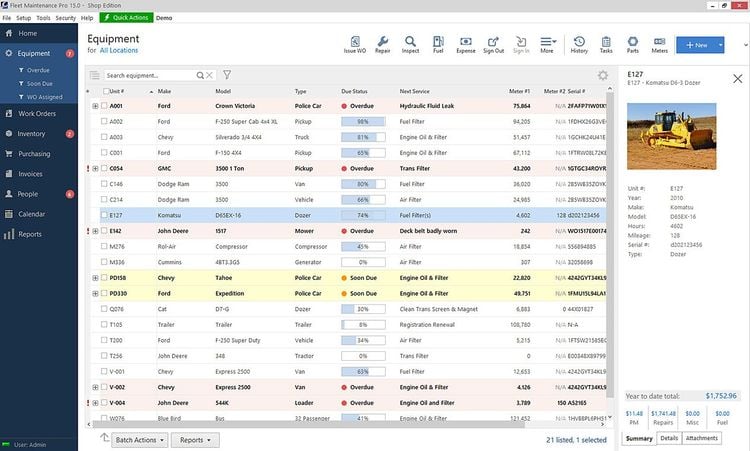
Key Features and Benefits
| Key Feature | Description | Benefit |
|---|---|---|
| Maintenance history | Store data on all past vehicle maintenance in one easy-to-access location. | Helps you stay organized and monitor which vehicles need work or constantly require maintenance. |
| Preventive maintenance | Schedule maintenance based on fixed variables like time or miles traveled to prevent failures. | Reduces the likelihood of breakdowns and costly repairs while automating the scheduling process. |
| Work Order Management | Keep records of past work orders and generate new ones based on recommended service, PM schedules, or unexpected issues. | Provides technicians with detailed descriptions of problems to help troubleshoot and repair. |
| Parts inventory | Manage your spare parts inventory to check on-hand quantities and replenish out-of-stock items. | Ensures you keep optimal inventory levels for your spare parts so you can always have the necessary repair tools. |
| Fuel management | Track and analyze fuel consumption for each vehicle; monitor trends in MPG or average cost. | Identify potential maintenance issues that affect fuel consumption; manage overall expenses and eliminate waste or theft. |
| Reporting and analytics | Create customizable reports on maintenance and labor costs, fuel economy, and other KPIs. | Helps you make data-driven decisions for your business and identify areas of improvement. |
| Vehicle diagnostics | Track real time data about vehicle location and health through IoT device integrations and receive fault notifications | Allows you to catch small issues before they lead to failures and ensure driver safety. |
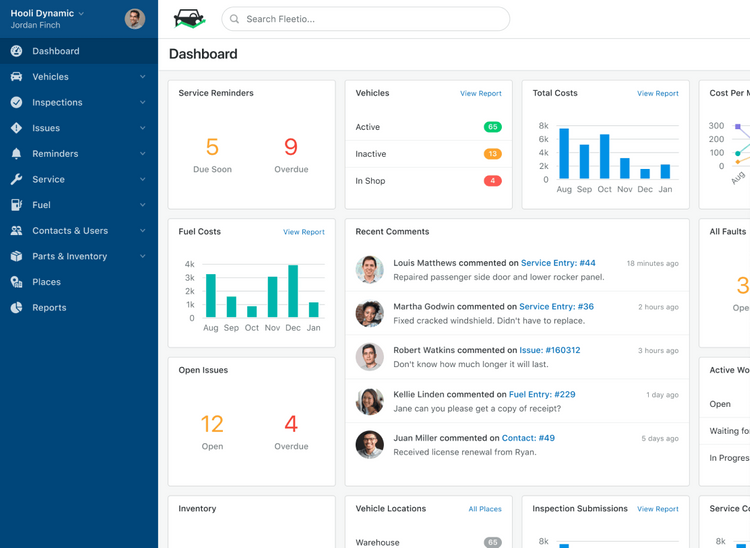
Common Industry Challenges
Fleet maintenance software can help alleviate these common industry challenges:
Unplanned Downtime
If your business depends on a fleet, you can’t afford a lot of downtime whenever a vehicle goes wrong. Every work order for replacement parts takes time to fulfill, which means more time your vehicle isn’t on the road. Especially if problems occur before delivery, they can throw the entire supply chain out of balance.
Preventive maintenance techniques can reduce maintenance service downtime by planning ahead. Real-time diagnostic tracking can go even further, helping you spot potential problems before they impact your business.
High Maintenance Costs
A missed oil change can cause permanent engine damage. A broken truck chassis can limit your hauling capacity. And balding tires can lead to dangerous accidents for your drivers. If you continually put off necessary repairs, your vehicles will slowly break down until they are detrimental to your bottom line.
Fleet maintenance software helps you set advance reminders to perform preventative maintenance tasks ranging from oil changes to full system checkups. Instead of playing catchup with service, you can know days, weeks, or months in advance when to schedule diagnostics and other basic services before they turn into expensive repairs.
Driver Safety
Ensuring driver safety is every logistics company’s number one priority. Without the proper maintenance scheduling, natural wear and tear can snowball into a major failure event. This can be extremely dangerous for drivers, especially long-haul truckers or those driving in difficult weather conditions.
The software reduces the chances of accidents caused by equipment failure by keeping up with critical tasks like brake inspections, tire replacements, and engine checkups. With reliable, well-maintained vehicles, your drivers can focus on operating safely and efficiently.
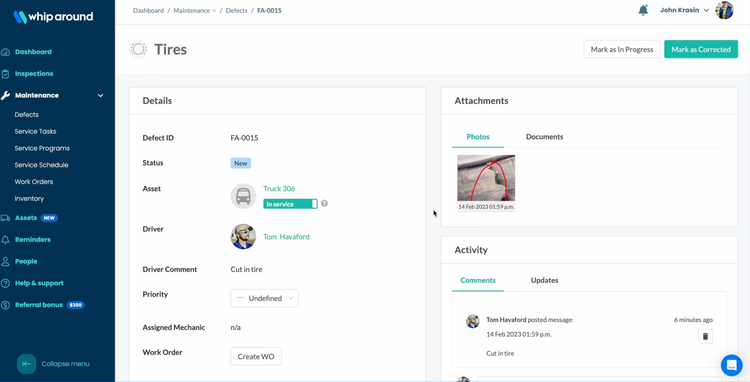
Fleet Maintenance vs Management
As mentioned, fleet maintenance and management have a few key differences. Fleet management software provides many additional tools like route optimization and telematics. While these logistical applications are helpful for businesses that rely on regularly scheduled deliveries, they’re not necessary for other vehicle-based business models. If you only need to know when to schedule and perform vehicle maintenance, like emissions testing, a fleet maintenance software is likely a better option for your company than a full fleet management suite.
For instance, a pizza delivery restaurant might benefit from a fleet management system that optimizes delivery routes and reduces wait times between stops. GPS tracking could also help monitor delivery efficiency and ensure timeliness. If drivers use personal vehicles, maintenance scheduling might fall under their responsibility instead of the business’s.
On the other hand, a small construction company with five company-owned trucks might prioritize fleet maintenance tools to ensure all vehicles are serviced regularly and kept in good condition. Since the construction crew typically operates within fixed job sites for extended periods, route optimization may not be as critical as ensuring equipment is transported safely, and vehicles remain reliable.
Pricing Guide
The price for fleet maintenance software starts at around $5-$100/vehicle/month. These vary based on the number of vehicles in your fleet, your user count, and the features you desire. Some systems, like AUTOsist, offer volume discounts for larger fleet sizes.
Most solutions offer tiered pricing plans that increase in cost with more features. For example, Fleetio has three different packages to choose from, starting with its Essential $4/vehicle/month plan. This only supports up to 100 vehicles and lacks work order functionality. The $7/vehicle/month Professional plan adds several features, including outsourced maintenance and automated workflows. Finally, the $10/vehicle/month premium plan unlocks all features.
| System | Starting Price |
|---|---|
| AUTOsist | $59/month minimum for 5 vehicles |
| Fleet Maintenance Pro | $30/user/month for cloud, $1,495 for perpetual license |
| Fleetio | $4/vehicle/month |
| Fullbay | Quote-based |
| MaintainX | Free, $16/user/month for paid plan |
| Samsara | Quote-based |
| Whip Around | Free, $5/vehicle/month for paid plan |


























